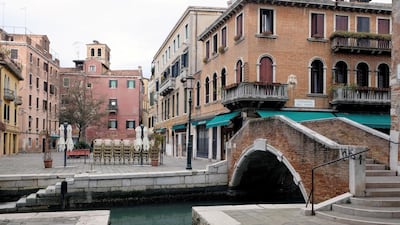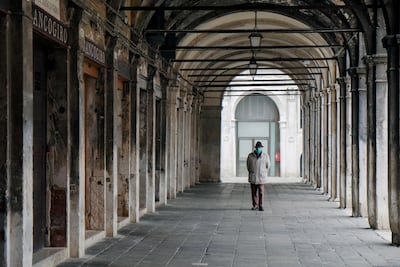I divide my time between homes in Paris and Venice, and plane tickets are always booked well in advance. So two weeks ago, I found myself ready to fly out from Charles de Gaulle airport to join my wife, who had flown to Venice a few days earlier.
But the day before my flight, news leaked of an announcement about to come from Italian Prime Minister Giuseppe Conte, stating that Venice would be part of the Zona Rossa region, with movement severely restricted in the city until Friday, April 3. Should I stay or should I go? Would there even be flights operating in such extraordinary circumstances?
EasyJet did not send any warnings and its flight tracker revealed that routes to Italy were absolutely confirmed, despite the quarantine. The idea of staying in La Serenissima for a month actually sounded quite appealing, and I felt sure we could always get a flight back to Paris if necessary.
So I boarded a near-empty flight and headed to the "dreaded" Zona Rossa. On arrival, there were no extra checks apart from having my temperature taken. Absolutely no one was wearing masks or surgical gloves, and 30 minutes later, I crossed a bridge over the Grand Canal on my way home. While the normal crowds of tourists had disappeared completely, plenty of Venetians were out and about, delighted to finally reclaim the city for themselves.
With the sun shining, we set off for lunch at the Michelin-starred Venissa restaurant on Mazzorbo island. The lagoon ferry, normally packed with tour groups, was almost empty and after our meal, the waiter told us that the restaurant was closing the next day. Indefinitely. It was a sign of things to come.
That evening in Venice, there was no chance of the ritual early evening drink, with bars and restaurants forced to close at 6pm. My indignant Venetian friend, Mario di Martino, complained: "We Venetians are like orphans without our bars and cafes, and what absurdity that you will catch the virus by eating out after 6pm but not during the rest of the day." The situation soon became far more surreal and scary, as the next day, Conte extended the restrictions to all of Italy, at the same time closing down everything except supermarkets, newsagents and pharmacies.
Funerals and weddings are banned, churches closed except for private prayer, schools and universities are shuttered, and even football matches are off. Friends organising dinner parties call to cancel – they have been contacted by their doctor and told not to invite people inside their house. There is a €350 (Dh1,430) fine if a neighbour denounces you.
Thinking now that it might be an idea to explore ways of getting back to Paris, we come up against a brick wall. All Paris flights are cancelled until Friday, April 3, the train to France is being stopped at the border, and if we take the one train heading to Zurich, it seems Swiss authorities will quarantine us for 14 days. “Hire a car and drop it off in Paris,” say our Venetian friends – all very well if you can afford the Zona Rossa tariff of €600 a day.
Switching on the TV, we are bombarded with a campaign encouraging the Italian population to remain indoors, to try to stop the propagation of Covid-19. Entitled #iostoacasa – I Stay Home –programmes are interrupted by smartphone videos from a host of TV celebrities, sportsmen, YouTube influencers and pop stars telling everyone how wonderful it is to have the chance to stay home rather than going out with friends.
The next morning, as it is officially allowed to go shopping, I venture out. My street in the bustling Cannaregio neighbourhood runs along a canal and is usually packed with people – locals and tourists – and alive with bars, restaurants and boutiques. Today it is totally empty, like a post-apocalyptic "day after" from the cult movie The Last Man on Earth.
There are some signs of life on the main drag, Strada Nuova, where more people are now wearing masks. Bakers, butchers and grocers are open, but only letting three people in at a time, while the rest of us politely queue up on the pavement, respecting the new law of a one-metre distance.
Strangely, opticians and pet shops are also open, while supermarkets are eerily empty as, there too, entry is limited to three customers at a time. Officially I should go home straight after shopping, but taking a risk, I walk to the Piazza San Marco. Venice is like ghost town, although a very beautiful one, almost as it used to be when I first came to live here and March was always one of the "quiet" months, with few tourists.
The locals I bump into admit they are happy to follow the government's strict regime if it beats the virus, with a defiant pensioner telling me: "This way we will show the rest of the world that there is an Italian example that other nations should follow."
As I pass by a favourite trattoria, the famous Mascaron, owner Gigi Vianello is closing up the kitchen. We end up leaving loaded with Tupperware boxes of sardines and meat ragu for pasta, and Vianello says with a wink that if we have any food problems later on to call him, as their freezer is full. That is typical Venetian solidarity.
Finally, we receive an official email from easyJet, offering the chance to rebook after Friday, April 3, free of charge. With seats confirmed for Sunday, April 5, we now have a little more than two weeks of staying home, watching classic movies, reading and playing Monopoly.
Food supplies seem to be assured and no one, so far, has gone on panic-buying sprees – there's plenty of pasta, rice and toilet rolls remaining in the aisles.
But the doubt remains. Will the lockdown be extended? Will France quarantine us when we arrive home? Only time will tell.


